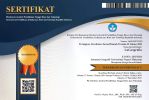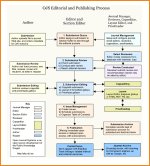Relationship Between Emotional Intelligence and Geography Learning Outcomes of Class XII Students at Wahdah Islamiyah Integrated Islamic High School Makassar
(1)
(2)
(3)
(*) Corresponding Author
DOI: https://doi.org/10.35580/lageografia.v20i1.22203
Abstract
This study aims to determine whether there is a relationship between emotional intelligence and geography learning outcomes in class XII Islamic Senior High School Wahdah Islamiyah Makassar. This research is a type of quantitative research with the Spearman Rank correlation method. The data collection technique uses a questionnaire. The sampling technique in this study used a saturated sampling technique with a total of 25 respondents. For learning outcomes data is taken from the grade XII student report cards in the geography subject. The results of the analysis of emotional intelligence data are included in the medium category with an average value = 107.84 at intervals 103–110, for geography learning outcomes are included in the low category with an average value = 83.52 at intervals 81-84, to prove whether or not there is a relationship between emotional intelligence and geography learning outcomes, it can be seen from the calculation obtained using the Spearman Rank correlation formula, where the value of rs =0.037, with a significant value of 0.861. Because sig > 0.05, it can be concluded that emotional intelligence does not have a significant relationship with geography learning outcomes and the relationship is included in the very low category.
Keywords
Full Text:
PDFReferences
Ahmadi, A. (2019). Psikologi sosial.
Arikunto, S. (2019). Prosedur penelitian.
Bancin, N. H. (2017). HUBUNGAN KECERDASAN EMOSIONAL DENGAN HASIL BELAJAR GEOGRAFI SISWA KELAS X SMA AMIR HAMZAH MEDAN TAHUN AJARAN 2016/2017. UNIMED.
Bariyyah, K., & Latifah, L. (2019). Kecerdasan Emosi Siswa Ditinjau dari Jenis Kelamin dan Jenjang Kelas. JPGI (Jurnal Penelitian Guru Indonesia), 4(2), 68–75.
Duhita, S. A., Suprapta, S., & Hasriyanti, H. (2020). Problematika Guru dalam Pelaksanaan Kurikulum 2013 pada Pembelajaran Geografi. LaGeografia, 18(2), 109–116.
Goleman, D. (2000). Kecerdasan emosional. Gramedia Pustaka Utama.
Hamalik, O. (2007). Proses Belajar Mengajar, cet. 6. Jakarta: Bumi Aksara.
Hasriyanti, H. (2019). Pengaruh Model Pembelajaran Cooperative Integrated Reading And Composition (Circ) Terhadap Hasil Belajar Siswa Sekolah Menengah Atas. LaGeografia, 18(1), 36. https://doi.org/10.35580/lga.v18i1.10974
Ibrahim, R. (2015). Pendidikan Multikultural: Pengertian, Prinsip, dan Relevansinya dengan Tujuan Pendidikan Islam. Addin, 7(1).
Indriawati, P. (2018). Pengaruh kepercayaan diri dan kecerdasan emosional terhadap hasil belajar mahasiswa Universitas Balikpapan. Jurnal Pendidikan Edutama, 5(2), 1–10.
Khalijah, S., Suprapta, S., & Abbas, I. (2021). Hubungan Perhatian Orang Tua terhadap Hasil Belajar Peserta Didik pada Pembelajaran Geografi. LaGeografia, 19(3), 401–416.
Nizar, S. (2002). Filsafat Pendidikan Islam: Pendekatan Historis, Teoritis dan Praktis. Ciputat Pers.
Nurjannah, H., Saputro, A., Maddatuang, M., & Fikri, M. J. N. (2020). Penerapan Model Pembelajaran Treffinger Pada Pembelajaran Geografi. LaGeografia, 19(1), 113–127.
Nyompa, S., Suprapta, S., Wahyuni, S., & Azhim, M. I. (2018). The Effect of Student Perception of Teacher Professional Competency On The Result of Geography Learning Class XI Social Science Student’s SMA 12 Sinjai. UNM Geographic Journal, 1(2), 131–136.
Pratiwi, P., Zhiddiq, S., Umar, R., & Saputro, A. (2021). Peningkatan Hasil Belajar Siswa Pada Pembelajaran Geografi Melalui Model Discovery Learning. LaGeografia, 19(2), 226–242.
Rifa, I. (n.d.). Achmad dan Catharina Tri Anni. 2012. Psikologi Pendidikan.
Sagala, S. (2010). Supervisi Pembelajaran dalam profesi pendidikan. Bandung: Alfabeta.
Salovey, P., & Mayer, J. D. (1990). Emotional intelligence. Imagination, Cognition and Personality, 9(3), 185–211.
Sudjana, N. (2010). Belajar dan Faktor-faktor yang Mempengaruhinya. Jakarta: Rineka Cipta.
Sugiyono, D. (2013). Metode penelitian pendidikan pendekatan kuantitatif, kualitatif dan R&D.
Sugiyono, P. (2019). Metode Penelitian Pendidikan (Kuantitatif, Kualitatif, Kombinasi, R&D dan Penelitian Pendidikan) (A. Nuryanto (ed.); Ke-3). Alfabeta.
Syarif, E., Syamsunardi, S., & Saputro, A. (2020). Implementation of Discovery Learning to Improve Scientific and Cognitive Attitude of Students. Journal of Educational Science and Technology (EST), 6(1), 23–31.
Uno, H. B. (2006). Orientasi baru dalam psikologi penbelajaran.
Article Metrics
Abstract view : 160 times | PDF view : 38 timesRefbacks
- There are currently no refbacks.
Copyright (c) 2021 Lisman Lisman, Ibrahim Abbas, Erman Syarif

This work is licensed under a Creative Commons Attribution-NonCommercial 4.0 International License.
LaGeografia: Jurnal Program Studi Pendidikan Geografi, Jurusan Geografi, Fakultas MIPA, Universitas Negeri Makassar.
Email: lageografia@unm.ac.id | +6285298749260
Editorial Office













































